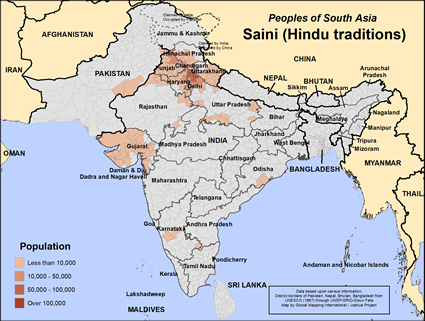Saini (Hindu traditions) in Pakistan

Photo Source:
Anonymous
|

Map Source:
People Group data: Omid. Map geography: UNESCO / GMI. Map Design: Joshua Project.
|
| People Name: | Saini (Hindu traditions) |
| Country: | Pakistan |
| 10/40 Window: | Yes |
| Population: | 2,700 |
| World Population: | 722,700 |
| Primary Language: | Saraiki |
| Primary Religion: | Hinduism |
| Christian Adherents: | 0.00 % |
| Evangelicals: | 0.00 % |
| Scripture: | New Testament |
| Ministry Resources: | Yes |
| Jesus Film: | Yes |
| Audio Recordings: | Yes |
| People Cluster: | South Asia Hindu - other |
| Affinity Bloc: | South Asian Peoples |
| Progress Level: |
|
Introduction / History
Saini have their origins with royal Rajput families of old. They were given land for their service to the ruler. The pattern for Rajput communities like the Saini is that they were notable miliary officers. Upon retirement settled in rural estates. Their land was farmed by lower castes. Most Hindu Saini left Pakistan and moved to India during the Partition of India in 1947.
The primary language of the Pakistani Saini is Saraiki. They also speak Urdu, the national language of Pakistan. Educated Saini speak English. Bible audio recordings, Bible portions and the JESUS Film are available in Saraiki.
They are Hindu and Sikh by religion. There are few in any Saini believers in Pakistan.
The Saini people live in India and Pakistan. A much smaller population of Muslims lives in India and Pakistan.
What Are Their Lives Like?
The Saini are more educated than the typical Pakistani people. They continue to own land. Many are business owners and work in government jobs. Some Saini are scientists, professors, engineers, and administrators.
Saini people enjoy a high literacy level, the product of their own education organizations. They use modern and local medicine and family planning. Parents encourage their children to attend universities and obtain graduate degrees.
The Saini marry only in their group. They often marry within clans and between villages. Adult marriages with one spouse are the usual custom. An additional spouse is allowed if the wife cannot have children. Divorce does not happen often but is allowed. Divorcees and the bereaved are allowed to remarry.
Property is inherited through the male lineage only, and all sons inherit equally. The oldest son becomes the head of the home upon his father's death. He also must take care of his elderly parents.
Saini women, in addition to housework, work outside the home. Women who are educated work for government and private businesses. They also take part in religious and social matters.
Saini have their own assemblies that see to the needs of their people. Community organizations settle family and land problems and cases involving divorce and adultery.
What Are Their Beliefs?
The Saini people of Pakistan practice Hinduism, the ancient religion of India. Hinduism is a catch-all phrase for the local religions of South Asia, so it is very diverse. At the popular level, Hindus worship and serve the gods of the Hindu pantheon. They visit Hindu temples and offer prayers, food, flowers, and incense to their gods in hopes of gaining protection and benefits. They do not have a personal or familial relationship with their gods as Christians do. There are other Hindus who are much more philosophical, especially among the Brahmins.
Almost all Hindus participate in yearly celebrations like Holi, the festival of colors and the start of spring / Diwali, the festival of lights / Navratri, the celebration of autumn / and Rama Navami, Rama's birthday.
What Are Their Needs?
The Saini need humility to see their need for Jesus Christ. Their high place in society can often be a hindrance in coming to their savior. Jesus alone can forgive their sins and grant them eternal life.
Prayer Points
Ask the Lord to send workers to the Pakistani Saini.
Pray the Spirit softens the hearts of the Saini so that they will be open to the good news.
Pray the Lord raises up a disciple making movement among the Hindu Pakistani Saini in this decade.